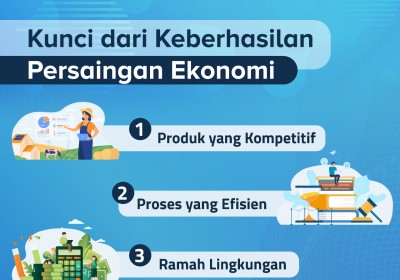Developing Competitive Industrial Zones to Attract Investors
July 19, 2021
JAKARTA – One of the government's main development agendas for the next few years ahead is to strengthen its economic sustainability. The 2020-2024 Mid-Term Working Plan (RPJMN) has outlined 7 key agendas to help achieve this goal, including improving workforce quality, simplification of bureaucracy, simplification of regulations, infrastructure development and economic transformation.
The key to achieving economic sustainability, explained Investment Coordinating Board (BKPM) deputy for investment planning Nurul Ichwan, is to also foster a competitive economy based on competitive products, efficient production and environmentally-friendly methods.
A high Incremental Capital Output Ratio (ICOR) shows the inefficiency of investment implementation in Indonesia.
"For every Rp 1 increase of the GDP, it needs at least Rp 6 investment. This is greater than the pre-crisis levels where you needed only Rp 4 investment for every Rp 1 increase. Compared to our neighbors, Indonesia's investment costs are still high," Ichwan explained during the Road to IDF 2021 Inspiring Session webinar on Tuesday 29/6.
The causes of high investment costs, added Ichwan, include inflexible and unclear regulation, inefficient bureaucracy, the abundance of permits needed to operate, high land procurement costs, high logistical costs and institutional corruption. Between 2015 to 2019, Indonesia is 6.8% below the investment attractiveness of countries such as India, Malaysia, the Philippines and Vietnam.
For Ichwan, an interesting way of attracting foreign investment to Indonesia is to build and maintain industrial zones that are competitive and sustainable. But to do so would require effective partnerships between academics, communities, industrial zones, the government and business actors. By forging clear partnerships, it could pave the way for attracting quality investment, drive up exports, improve technological knowledge and focus on environmentally friendly methods.
"Regarding the stakeholders that I mentioned; ministries and government institutions must help them by creating policies that improve Indonesia's investment climate. The BKPM is aiming to raise our ease of doing business ranking higher, of which we are 73rd in the world," Ichwan explained.
"Also, I'd like to point out the importance of domestic investors in making this possible, because, other than being direct investors themselves to these industrial zones, they have the ability to partner directly with foreign investors to ease their entry into Indonesia," he added.
Indonesia’s Research Institutions Supporting the Development of the Electric Vehicle Industry
Indonesian Muslim Fashion and Cosmetics IKMs Shine at Dubai World Expo 2020
Govt Steps Up UMKM Transformation Efforts in the Midst of Pandemic Slowdown
Govt Encourages Promotion of IKM Products in Digital Era
Government Begins Developing Maritime Training Center in Makassar
Tweets by IDDevForum
